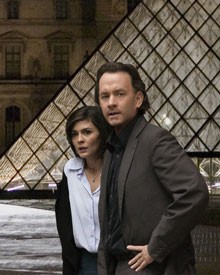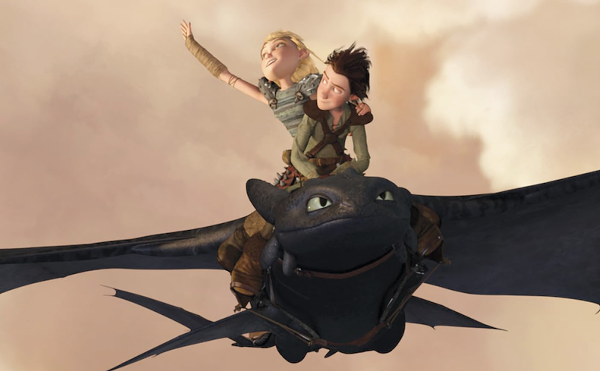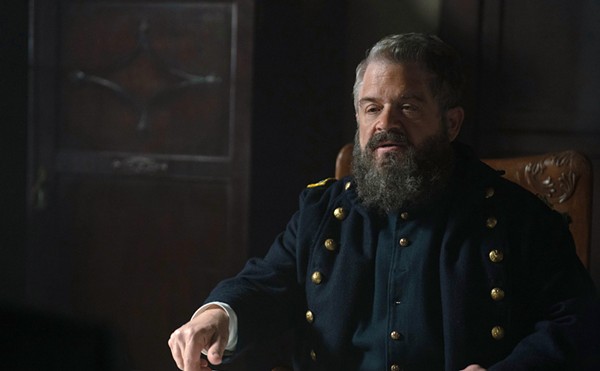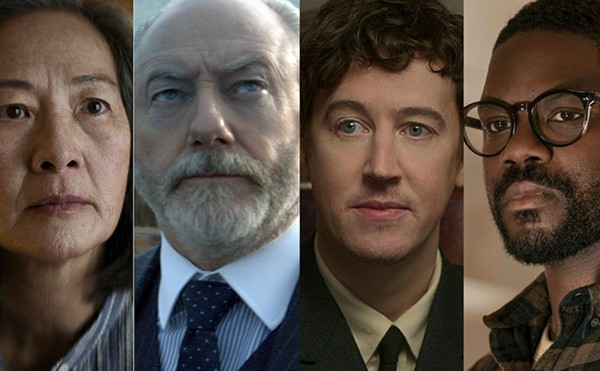How many children did Lady Macbeth have? Despite fierce scholarly disputes, the question never incited murder. But the claim that Jesus begot a child with Mary Magdalene has, in Dan Brown’s adroit imagination, left a trail of blood staining two thousand years. Many pious contemporary Christians are incensed at the fictional premise that, as one character puts it, “the greatest story ever told is a lie.” It is safer to fool with Shakespeare than with Matthew, but, thus far, at least, revision of Christendom’s sacred texts has not provoked the violence found within Brown’s popular novel — or among Muslims enraged by mockery of their holy Prophet.
| Run, Robert, run: Tom Hanks and Audrey Tatou star in Ron Howard’s The Da Vinci Code. |
Ron Howard begins his movie adaptation of The Da Vinci Code without the disclaimer demanded by some Christian leaders. Yet in the opening moments, when Robert Langdon, identified as a Harvard “professor of religious symbology” (Is the Department of Religious Symbology located across campus from Microbiology?), delivers a lecture in Paris, viewers must be willing to turn off their cell phones and suspend disbelief. “We’ve been dragged into a world of people who believe this stuff is real,” complains the skeptical Langdon (Hanks) about the bizarre plot that he, like one of Hitchcock’s innocent protagonists, suddenly finds himself entangled in. One may or may not believe all that stuff about an ancient Crucifixion and Resurrection, but it is hard to swallow this story about a secret conspiracy to erase any trace of Jesus’s progeny. Much more credible is its suggestion that Christian history has been organized misogyny.
When Captain Fache (Reno), a zealous inspector who happens to be a member of real-life Conservative Catholic sect Opus Dei, interrogates him about a ritual murder in the Louvre, Langdon flees with the aid of police cryptologist Sophie Neveu (Tatou). The Da Vinci Code is largely a buoyant, boyish caper, in which Langdon and Sophie, resembling no one so much as the Hardy Boys, rely upon their wits to outmaneuver their pursuers and solve “the biggest cover-up in human history.” Fibonacci numbers, hidden bank accounts, ingenious anagrams, enigmatic paintings, and arcane codes are scattered along the way, to test the professor and the cryptologist and tease the audience. This is a cinematic puzzle whose pleasures are cerebral and whose exposition almost asphyxiates the action. Except for Ian McKellen, playing a flamboyantly eccentric patrician scholar, the story steals the show from any actor.
“It’s nonsense,” says Sophie, in a self-conscious line designed to inoculate the film against charges of blasphemy. However, beyond the fantastic account of competing cabals intent on either sustaining or eradicating the Magdalenian lineage of holy succession, The Da Vinci Code raises important questions about story and authority. Langdon and Sophie flee agents of a loveless, self-flagellating patriarchy that would deny the truths in the professor’s new book, Symbols of the Sacred Feminine, as well as the apocryphal Gospel of Mary Magdalene. The men who ran the Council of Nicaea in 325 established a Biblical canon and doctrinal orthodoxy that was as arbitrary and fallible as anything else that human beings have put on paper or the screen. It is a telling irony in The Da Vinci Code that the sole surviving descendant of Jesus turns out to be agnostic. That might be the ideal attitude for viewing this movie, and for reading even sacred texts.
















